# Table WSHOSHO
SELECT * FROM WSHOSHO;
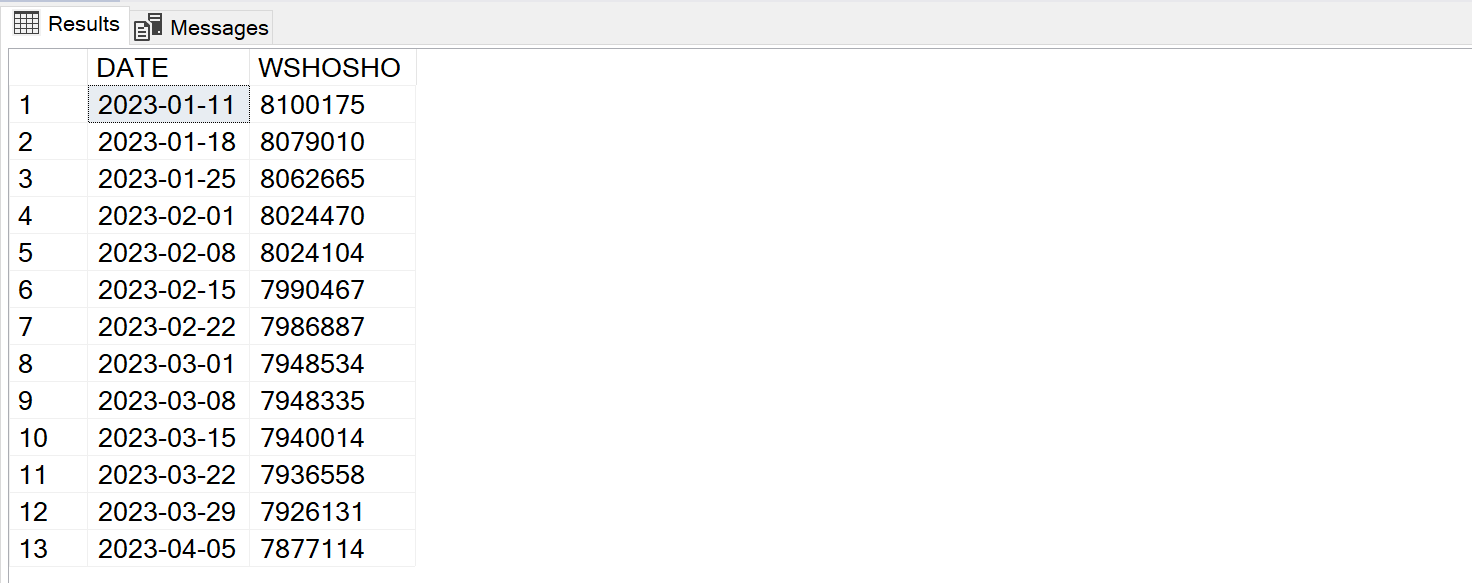 # Table RRP
SELECT * FROM RRP;
# Table RRP
SELECT * FROM RRP;
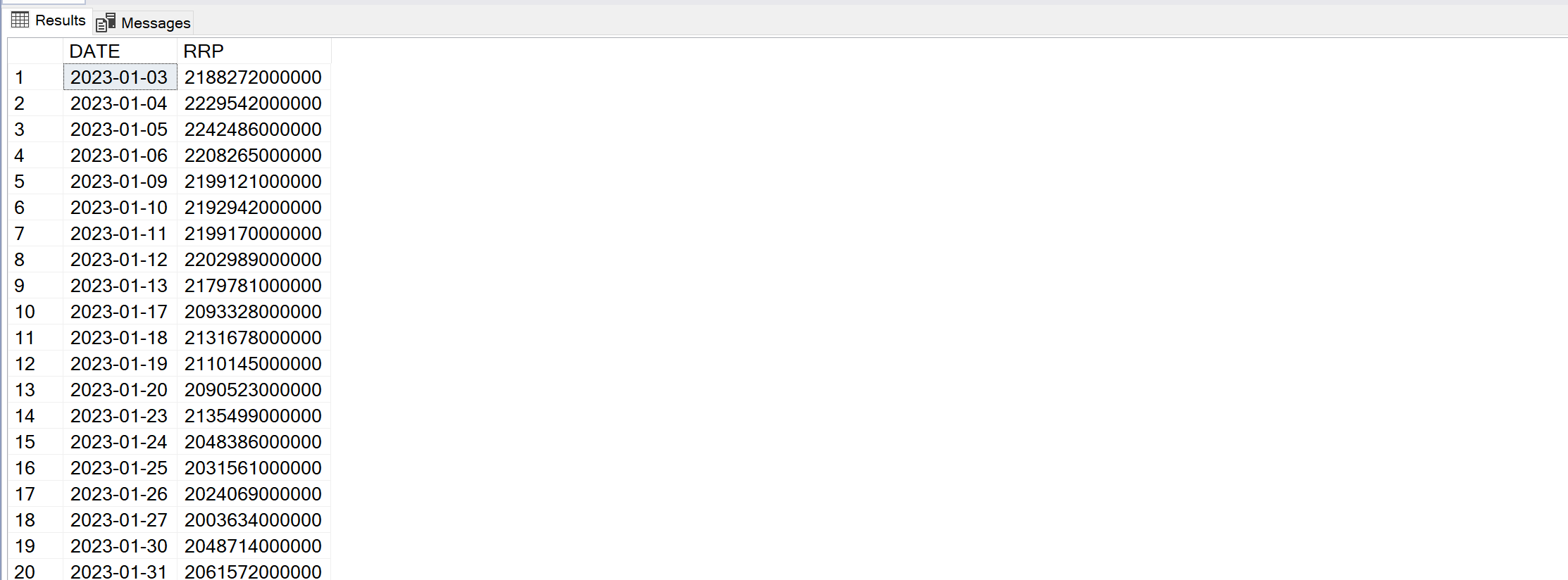 # Join to illustrate issue
The results of this join can be used to illustrate the issue:
SELECT * FROM WSHOSHO RIGHT JOIN RRP ON (WSHOSHO.DATE = RRP.DATE);
Result:
# Join to illustrate issue
The results of this join can be used to illustrate the issue:
SELECT * FROM WSHOSHO RIGHT JOIN RRP ON (WSHOSHO.DATE = RRP.DATE);
Result:
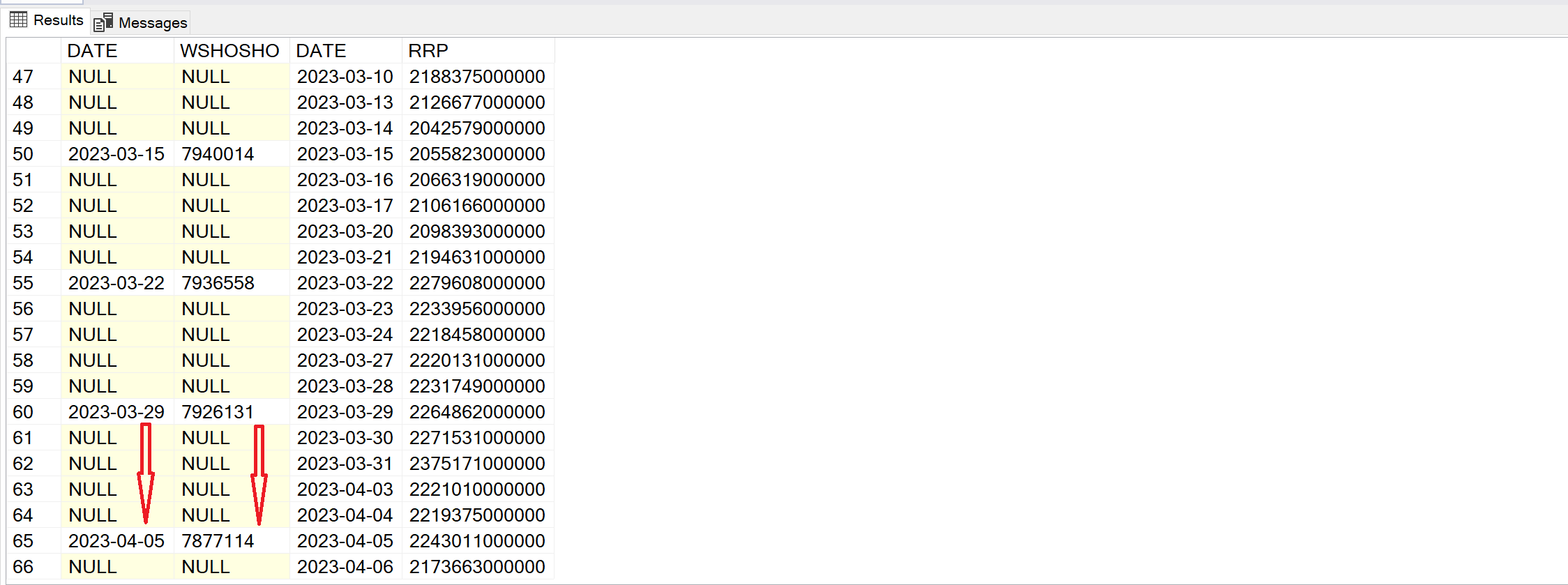 I.e.:
I.e.:
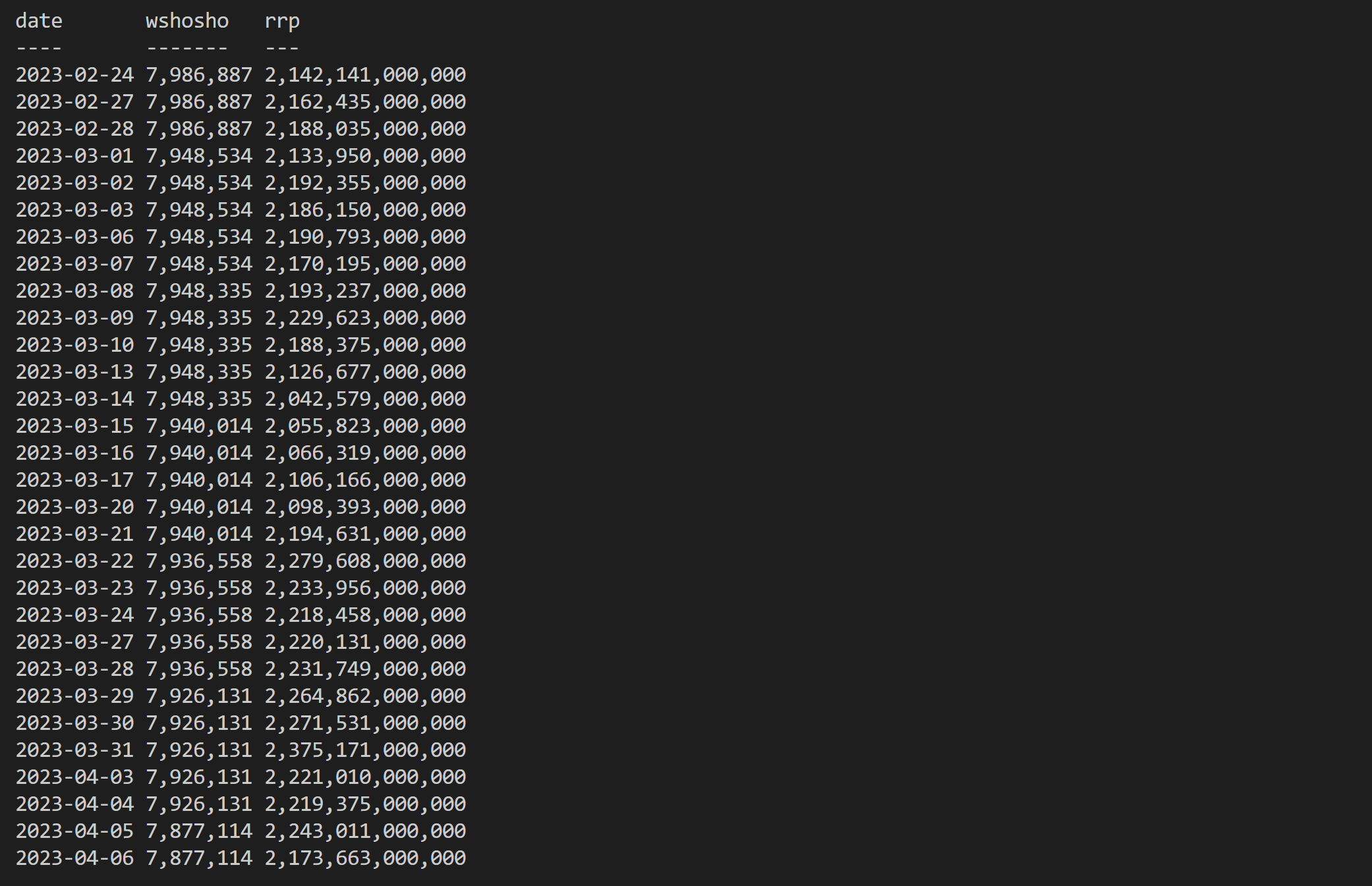 # White Owl's approach
Here's an approach based on White Owl's answer below.
# White Owl's approach
Here's an approach based on White Owl's answer below.
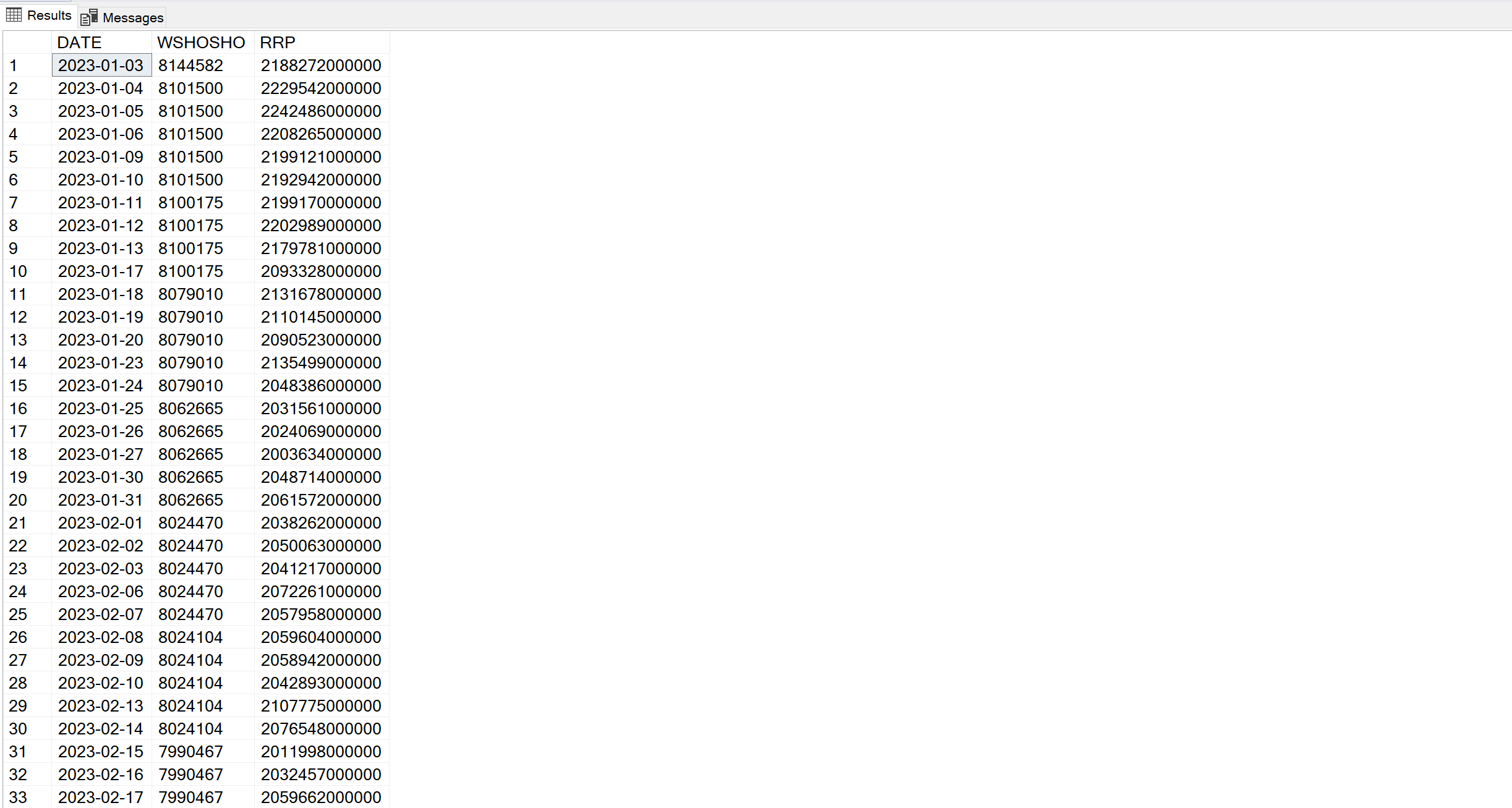
 # Table RRP
SELECT * FROM RRP;
# Table RRP
SELECT * FROM RRP;
 # Join to illustrate issue
The results of this join can be used to illustrate the issue:
SELECT * FROM WSHOSHO RIGHT JOIN RRP ON (WSHOSHO.DATE = RRP.DATE);
Result:
# Join to illustrate issue
The results of this join can be used to illustrate the issue:
SELECT * FROM WSHOSHO RIGHT JOIN RRP ON (WSHOSHO.DATE = RRP.DATE);
Result:
 I.e.:
I.e.:
For any given row of RRP
If there's a WSHOSHO row with the same date, use that
Otherwise, use the most recent WSHOSHO before RRP.DATEDROP TABLE WSHOSHO;
DROP TABLE RRP;
IF NOT EXISTS (SELECT * FROM sysobjects WHERE name='WSHOSHO')
CREATE TABLE WSHOSHO (
DATE varchar(255),
WSHOSHO decimal
)
IF NOT EXISTS (SELECT * FROM sysobjects WHERE name='RRP')
CREATE TABLE RRP (
DATE varchar(255),
RRP decimal
)
INSERT INTO WSHOSHO
VALUES
('2023-01-11', 8100175.0),
('2023-01-18', 8079010.0),
('2023-01-25', 8062665.0),
('2023-02-01', 8024470.0),
('2023-02-08', 8024104.0),
('2023-02-15', 7990467.0),
('2023-02-22', 7986887.0),
('2023-03-01', 7948534.0),
('2023-03-08', 7948335.0),
('2023-03-15', 7940014.0),
('2023-03-22', 7936558.0),
('2023-03-29', 7926131.0),
('2023-04-05', 7877114.0);
INSERT INTO RRP
VALUES
('2023-01-03', 2188272000000),
('2023-01-04', 2229542000000),
('2023-01-05', 2242486000000),
('2023-01-06', 2208265000000),
('2023-01-09', 2199121000000),
('2023-01-10', 2192942000000),
('2023-01-11', 2199170000000),
('2023-01-12', 2202989000000),
('2023-01-13', 2179781000000),
('2023-01-17', 2093328000000),
('2023-01-18', 2131678000000),
('2023-01-19', 2110145000000),
('2023-01-20', 2090523000000),
('2023-01-23', 2135499000000),
('2023-01-24', 2048386000000),
('2023-01-25', 2031561000000),
('2023-01-26', 2024069000000),
('2023-01-27', 2003634000000),
('2023-01-30', 2048714000000),
('2023-01-31', 2061572000000),
('2023-02-01', 2038262000000),
('2023-02-02', 2050063000000),
('2023-02-03', 2041217000000),
('2023-02-06', 2072261000000),
('2023-02-07', 2057958000000),
('2023-02-08', 2059604000000),
('2023-02-09', 2058942000000),
('2023-02-10', 2042893000000),
('2023-02-13', 2107775000000),
('2023-02-14', 2076548000000),
('2023-02-15', 2011998000000),
('2023-02-16', 2032457000000),
('2023-02-17', 2059662000000),
('2023-02-21', 2046064000000),
('2023-02-22', 2113849000000),
('2023-02-23', 2147417000000),
('2023-02-24', 2142141000000),
('2023-02-27', 2162435000000),
('2023-02-28', 2188035000000),
('2023-03-01', 2133950000000),
('2023-03-02', 2192355000000),
('2023-03-03', 2186150000000),
('2023-03-06', 2190793000000),
('2023-03-07', 2170195000000),
('2023-03-08', 2193237000000),
('2023-03-09', 2229623000000),
('2023-03-10', 2188375000000),
('2023-03-13', 2126677000000),
('2023-03-14', 2042579000000),
('2023-03-15', 2055823000000),
('2023-03-16', 2066319000000),
('2023-03-17', 2106166000000),
('2023-03-20', 2098393000000),
('2023-03-21', 2194631000000),
('2023-03-22', 2279608000000),
('2023-03-23', 2233956000000),
('2023-03-24', 2218458000000),
('2023-03-27', 2220131000000),
('2023-03-28', 2231749000000),
('2023-03-29', 2264862000000),
('2023-03-30', 2271531000000),
('2023-03-31', 2375171000000),
('2023-04-03', 2221010000000),
('2023-04-04', 2219375000000),
('2023-04-05', 2243011000000),
('2023-04-06', 2173663000000);$wshosho_data = Invoke-RestMethod 'https://fred.stlouisfed.org/graph/fredgraph.csv?id=WSHOSHO ' | ConvertFrom-Csv
$rrp_data = Invoke-RestMethod ('https://markets.newyorkfed.org/api/rp/reverserepo/propositions/search.json?startDate={0} ' -f '2022-04-08')
# ----------------------------------------------------------------------
$wshosho_sorted = $wshosho_data | Sort-Object DATE
$rrp_sorted = $rrp_data.repo.operations | Sort-Object operationDate
# ----------------------------------------------------------------------
$wshosho_sorted | Select-Object -Last 10 | ft *
$rrp_sorted | Select-Object -Last 10 | ft operationDate, totalAmtAccepted
# ----------------------------------------------------------------------
$wshosho_dates = $wshosho_sorted | ForEach-Object DATE
$rrp_dates = $rrp_sorted | ForEach-Object operationDate
# ----------------------------------------------------------------------
$rrp_earliest = $rrp_dates | Sort-Object | Select-Object -First 1
$wshosho_earliest = $wshosho_dates | Sort-Object | Select-Object -First 1
$earliest = $rrp_earliest, $wshosho_earliest | Sort-Object | Select-Object -Last 1
# ----------------------------------------------------------------------
$dates = $rrp_dates + $wshosho_dates | Sort-Object | Select-Object -Unique | Where-Object { $_ -GE $earliest }
# ----------------------------------------------------------------------
$table = foreach ($date in $dates)
{
$rrp_record = $rrp_sorted.Where( { $_.operationDate -le $date }, 'Last' )
$wshosho_record = $wshosho_sorted.Where( { $_.DATE -le $date }, 'Last' )
$rrp_item = [decimal] $rrp_record.totalAmtAccepted
$wshosho_item = [decimal] $wshosho_record.WSHOSHO
[PSCustomObject]@{
date = $date
wshosho = $wshosho_item
rrp = $rrp_item
}
} # White Owl's approach
Here's an approach based on White Owl's answer below.
# White Owl's approach
Here's an approach based on White Owl's answer below.
SELECT
RRP.DATE,
(
CASE WHEN WSHOSHO.DATE IS NULL
THEN
(
SELECT TOP(1) TBL.WSHOSHO FROM WSHOSHO as TBL WHERE TBL.DATE < RRP.DATE ORDER BY TBL.DATE DESC
)
ELSE
WSHOSHO.WSHOSHO
END
) AS WSHOSHO,
RRP.RRP
FROM RRP LEFT JOIN WSHOSHO ON (WSHOSHO.DATE = RRP.DATE);
Asked by dharmatech
(165 rep)
Apr 8, 2023, 07:10 PM
Last activity: Apr 10, 2023, 07:06 AM
Last activity: Apr 10, 2023, 07:06 AM